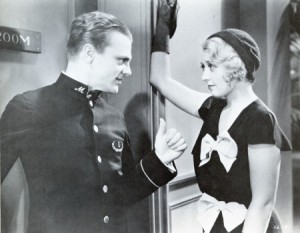Working-Class America in American Cinema of the Depression and New Deal
Written in May 2014 for De Lumière a Kaurismäki: La clase obrera en el cine, coedited by Carlos F. Heredero and Joxean Fernández and published by Colección Nosferatu in 2014. — J.R.
Writing about the reception of Brecht’s Threepenny Opera in pre-Hitler [1928] Germany, Hannah Arendt noted (in The Origins of Totalitarianism) that “The play presented gangsters as respectable businessmen and respectable businessmen as gangsters. The irony was somewhat lost when respectable businessmen in the audience considered this a deep insight into the ways of the world and when the mob welcomed it as an artistic sanction of gangsterism. The theme song in the play, “Erst kommt das Fressen, dann kommt die Moral [First comes food, then comes morals],” was greeted with frantic applause by exactly everybody, though for different reasons. The mob applauded because it took the statement literally; the bourgeoisie applauded because it had been fooled by its own hypocrisy for so long that it had grown tired of the tension and found deep wisdom in the expression of the banality by which it lived; the elite applauded because the unveiling of hypocrisy was such superior and wonderful fun. The effect of the work was exactly the opposite of what Brecht had sought by it.” Read more

